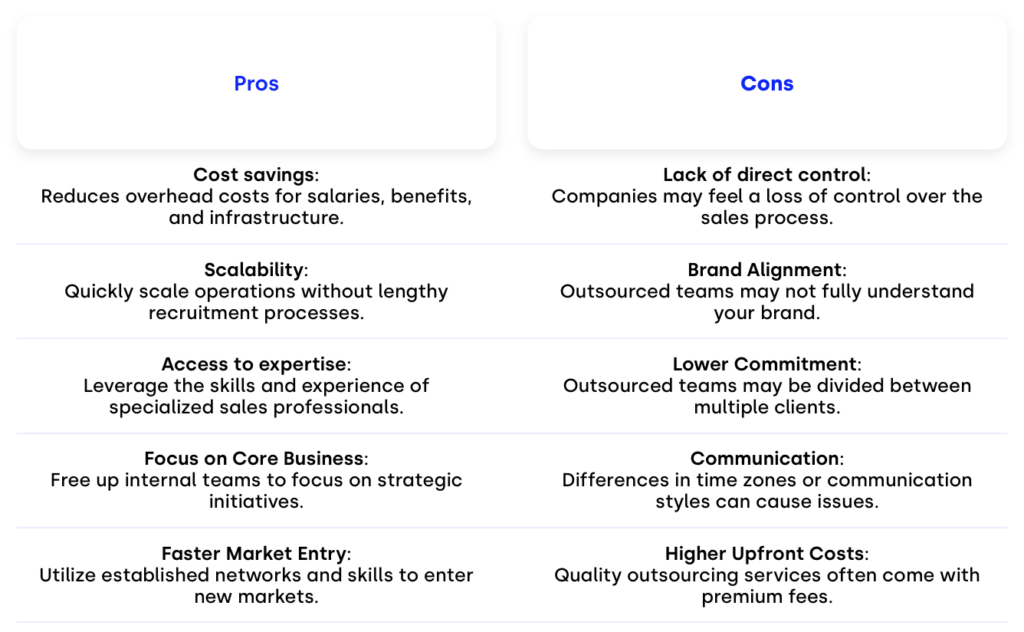The Ultimate Guide to Sales Team Outsourcing

Last year, global spending on sales outsourcing reached 730+ billion*, and an estimated 300,000 jobs are outsourced from the US every year. But what motivates SMBs and enterprises alike to outsource?
In this article, we’ll discuss what sales outsourcing is, what motivates the practice in companies of all sizes, help you decide if it’s for you, and prepare you to kick off the process.
Key takeaways:
- Sales outsourcing helps businesses streamline operations, penetrate new markets, and meet sales goals efficiently by partnering with external providers.
- Outsourcing carries the added benefit of cutting down costs, boosting growth, giving teams access to expert knowledge, and freeing up resources.
- Sales outsourcing is used by companies of all types and sizes, but it requires a careful selection process, negotiation, and well-planned implementation.
Try CloudTalk for 14 Days Completely Free!
What Is Sales Outsourcing?
Sales outsourcing is a type of Business Process Outsourcing (BPO), commonly employed by both B2B and B2C businesses, where companies hire 3rd party organizations and contractors instead of developing a complete in-house team.
This technique is especially useful for businesses that either can’t afford to maintain large teams and specialized full-time employees or simply don’t need their services frequently enough for them to be financially effective.
This approach aligns well with the concept of fractional hiring, allowing businesses to access specific expertise on an as-needed basis without the commitment of a full-time team.
In terms of sales outsourcing specifically, companies may also choose to outsource services such as prospecting, lead generation, account management, or even the entire sales process when they want to grow and expand into new markets quickly.
How Does Sales Outsourcing Work?
Sales outsourcing works by matching a customer’s business needs with the provider’s services. However, building a successful relationship requires a careful and intentional selection and setup process. This consists of several steps, including:
- Needs Assessment: Before you outsource your sales team, you first need to know what you want to achieve and what success looks like for you. That means defining your sales goals, target market, and the scope of required services.
- Partner Selection: Next, you need to collect a list of potential partners and narrow it down to the best possible candidate. You must consider their expertise, tools, team composition, and previous projects.
- Contractual Agreement: Once you settle on a sales outsourcing partner, it’s time to draft, discuss, and sign a binding contract. This should include terms of service, required deliverables, expected KPIs, and a set timeline.
- Implementation: Next, both parties need to ensure they are properly aligned in their processes to achieve the desired results. This may require some training and learning sessions before the outsourced team begins their work.
- Performance Monitoring: Finally, it’s vital that both parties carefully monitor the project’s progress, evaluate KPIs and goals on a rolling basis, and make any necessary adjustments to meet the contractual obligations outlined before.
Why Is Sales Outsourcing Important?
There are a wide variety of situations where you may want to consider outsourcing a part or all of your sales processes to a 3rd party organization. However, there are 4 common situations that usually drive businesses to do so. These include:
- Fast Scaling: The hiring process is often time-consuming and expensive. By outsourcing sales processes while entering new markets, you can maintain velocity without having to look for local talent.
- Cost Cutting: Outsourcing isn’t always the cheapest option, but if done right, it can consume fewer resources in terms of salaries, training, and infrastructure costs associated with standard in-house teams.
- Expert Access: Skilled and highly qualified talent is often hard to come by, especially at an affordable rate. Sales outsourcing allows teams to tap into the minds of experts without spending too much.
- Freeing Up Resources: Sometimes, your in-house team just doesn’t have the time to keep up with all your necessary initiatives. In these cases, outsourced sales teams can help fulfill your KPIs and keep everything on track.
Better, Faster, Stronger Cold Calls with Dialers
Pros & Cons of Sales Outsourcing
Beyond the price tag, the cost of every action taken or decision made can be expressed in the effect of doing the opposite. To help you decide whether sales outsourcing is the right choice for you, we’ve collected a list of its biggest pros and cons. This includes:

3 Types of Sales Outsourcing
Based on the scope or amount of work you hand off to an external company, sales outsourcing can be divided into 3 general categories, each with its pros and cons. Below, we’ll discuss how these differ in terms of use cases, pricing, etc.
#1: Full Outsourcing
As the name suggests, full outsourcing refers to when a company hands off its entire sales function to an external provider. This is often the most expensive option due to the sheer amount of work required, making it inaccessible to businesses like SMBs.
Full outsourcing is most commonly used by tech startups and SaaS companies that don’t have the time to build an entire sales team from the ground up due to fast growth requirements and that have the financial backing to justify this approach.
#2: Partial Outsourcing
In partial outsourcing, businesses tend to have at least a small-scale sales team that retains control over aspects of their sales process, such as account management or deal-closing. This tends to be more mature SMBs and mid-market companies.
This approach is less expensive by the pure virtue of requiring less work and is most often used by businesses that have a solid handle on their existing customer base but need to increase their outbound sales efforts.
#3: Project-Based Outsourcing
Based on the scope or amount of work you hand off to an external company, sales outsourcing can be divided into 3 general categories, each with its pros and cons. Below, we’ll discuss how these differ in terms of use cases, pricing, etc.
6 Tips for Before You Start Outsourcing Your Sales
By now, you should have a solid idea of whether sales outsourcing might be something for you. However, before you dive into the process, there are several things you should do to ensure it goes as smoothly as possible. The 6 tips to consider include:
- Set Clear Goals: Define your objectives, whether it’s increasing revenue, entering a new market, or improving lead quality. Ensure that these goals are communicated clearly to your outsourcing partner.
- Evaluate Expertise: Assess the potential partner’s industry expertise, client testimonials, and case studies. A proven track record is crucial in ensuring a successful partnership.
- Understand the Costs: While sales outsourcing can save money, you should have a clear understanding of pricing structures and potential hidden costs (like onboarding or technology fees).
- Ensure Alignment: Make sure the outsourced team understands your brand, company culture, and value propositions to effectively represent your business by holding learning sessions and brand presentations.
- Monitor KPIs: Set measurable KPIs from the outset and regularly monitor performance. This ensures transparency and keeps your outsourcing provider accountable.
- Establish Communication Channels: Clear communication is critical. Set up regular meetings and updates to track progress, address concerns, and maintain alignment with your goals.
Get 50% Off Your First Month with CloudTalk
Top 10 Software Solutions for Sales Outsourcing
Outsourced sales teams tend to have their own marketing and sales toolset. However, there is often some room for negotiation, and you may be able to persuade them to onboard a select number of solutions to make your partnership run smoothly.
Below, we’ve gathered a list of software solutions spanning Customer Relationship Management (CRM) platforms, Business Intelligence (BI), automation, and more – all compatible with CloudTalk’s call center software. These include:
- CloudTalk: Deliver exceptional customer experiences while speeding up and growing your outreach with advanced AI tools and 160+ international numbers.
Learn More - Salesforce: Boost productivity, drive more sales, and make your customers happier with the #1 AI CRM in the market.
Learn More - HubSpot: Connect your data, teams, and customers on the same CRM platform to seamlessly grow your business.
Learn More - Pipedrive: Engage leads across various channels, organize important tasks, and streamline in-house communication.
Learn More - Outreach: Unleash seller productivity across the sales cycle — from sellers to front-line managers, sales leadership, and ops.
Learn More - Gong: Power revenue decisions by the deepest understanding of sales conversations and the most accurate AI models.
Learn More - MindTickle: Elevate your team’s performance with one platform for sales training, enablement, and call insights.
Learn More - Dataddo: Integrate your call data with any CRM or Helpdesk with a click and create better sales and customer experiences.
Learn More - NiceReply: Turn simple one-click surveys into feedback. and feedback into opportunities to grow and improve your business.
Learn More - Modjo: Save time on each sale and generate more revenue. Let agents do what they do best while AI does the rest, including call summaries and ratings.
Learn More - AmpleMarket: Support your sales team every step of the way with a savvy AI assistant that saves time and boosts results for prospecting, engagement, etc.
Learn More
Unlock Your Business Growth with Sales Outsourcing
Sales outsourcing offers businesses the opportunity to scale efficiently, reduce costs, and access top-tier talent. By outsourcing key sales processes, you can focus on core operations and drive sustained growth.
When done strategically, sales outsourcing not only boosts revenue but also opens doors to new markets. Start exploring your options today and take your business to the next level!
Unlock the Power of Outsourcing for Your Team
FAQs
What are the benefits of outsourcing your sales team?
Outsourcing your sales team provides several benefits, including cost savings, scalability, access to experienced professionals, faster market entry, and the ability to focus on core business activities. It also allows businesses to reduce the overhead associated with in-house hiring and training.
What is outbound sales outsourcing?
Outbound sales outsourcing involves hiring an external provider to handle proactive sales efforts, such as call center, email outreach, and prospecting. The outsourced team reaches out to potential clients on behalf of the company to generate leads and close sales.
How to measure success after sales process outsourcing?
Success after sales outsourcing is measured by tracking key performance indicators (KPIs) such as lead conversion rates, revenue growth, cost per acquisition, and the number of closed deals. Regularly evaluating these metrics ensures the outsourced team is meeting business objectives.
What are the most common reasons that sales outsourcing fails?
Sales outsourcing often fails due to poor communication, lack of alignment with company goals, insufficient integration with internal teams, unrealistic expectations, and choosing the wrong outsourcing partner.
Who needs sales outsourcing?
Sales outsourcing is ideal for businesses looking to scale quickly, reduce costs, enter new markets, or access specialized sales expertise. Startups, companies expanding into new regions, and businesses with limited internal resources often benefit from outsourcing their sales efforts.
























